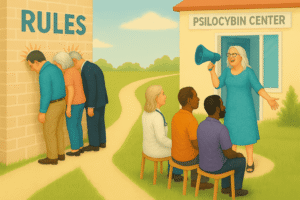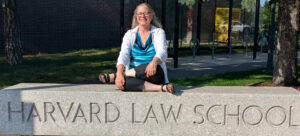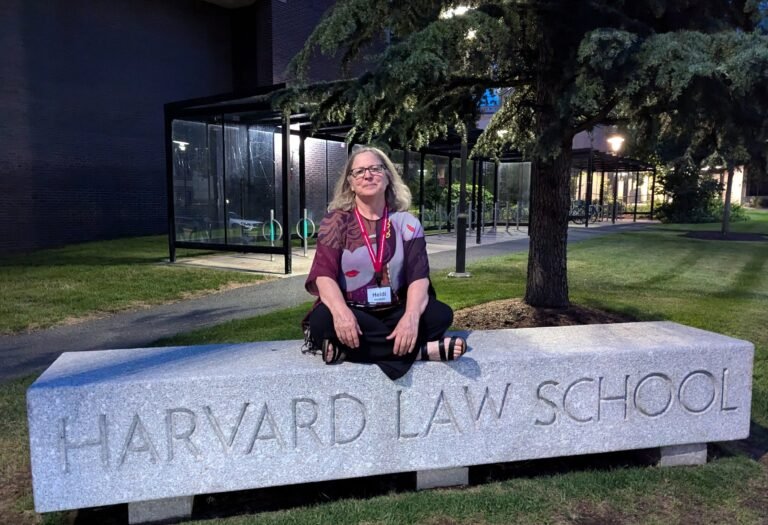A Legacy Reawakened: Why Harvard and Psychedelics Belong Together
Harvard University’s relationship with psychedelics stretches back to the 1950s and 1960s, when trailblazers like Timothy Leary and Richard Alpert investigated psilocybin and LSD within its storied halls. Today, alongside world-class research into neural mechanisms and clinical trials, Harvard is cultivating the next generation of psychedelic policymakers, lawyers, and clinicians. The Psychedelic Boot Camp—an intensive two-day immersion—was created to bridge science, law, and industry, drawing half its attendees from the legal profession.
From 2024’s First Visit to 2025’s Second Act
In 2024, I (Heidi Venture) joined the first Harvard Psychedelic Bootcamp’s panel on “The Oregon Experiment,” sharing our early regulatory victories and challenges. Though honored, I was not as prepared as I would have liked. When the invitation to return in 2025 arrived, I decided this was an opportunity to do better, to spend time preparing, to show up ready to contribute, and ready to learn.
Serendipity Over Pepperoni
John, my partner in life and at Vital Reset, hadn’t made the attendee list—capacity was limited. Yet John is a manifester: he calmly believed he’d find a way in. Upon arriving the night before Bootcamp, we strolled to a nearby pizza shop at 4:00 PM. The waitress could have seated us anywhere in the almost-empty restaurant, but she seated us next to the only other couple. Awkward! She could have seated us anywhere!
Then, I suddenly recognized we’d been seated next to the boot camp’s founder, Mason. Still a bit awkward, but we found our way. I mentioned to Mason that John hadn’t made the attendee list and might be trying to sneak in. Mason sprang into action, made a quick call, and three minutes later confirmed, “John’s in.” The spirit of collaboration was alive and well. And John once again proved his ability to manifest what he needs.
The next morning, we both arrived at the Harvard Law School ready to learn and participate fully.
Respecting Native Wisdom and Making Things Right
The first of the boot camp’s speakers led in-depth discussions with indigenous representatives. They spoke passionately about the often-overlooked role of Native communities in preserving and transmitting knowledge of psychedelic plant medicines. They proposed concrete solutions—securing seats for indigenous voices on state regulatory boards, within DEA advisory panels, and at the heart of industry consortia. Reparations also featured prominently: businesses profiting from psychedelics were encouraged to commit resources and support to indigenous communities. My key takeaway was the depth of care these representatives bring—not only a desire to be included in governance but a deep concern for ensuring that plant medicines are used responsibly and respectfully, honoring the traditions from which they originate.
Engaging Minds: Panels, Q&A, and Break-Time Conversations
My 10-minute talk, refined through a clear slide deck, focused on:
-
Joy! (thousands of people have come to Oregon, and most have left with healing, growth, and relief)
-
Ongoing hurdles (advertising restrictions, stigma, client access, 13 service centers have closed)
-
Strategic priorities (public awareness, )
I spent a bit of time complaining about how much work we put in to changing the rules, mostly to give clients a better experience, but also to make the industry more potentially stable. One thing I learned about myself while prepping: I’m tired of hitting my head against that wall only to fail, with no clear path to making needed changes. 
But the real magic happened during the two-day boot camp’s lively Q&A and informal breaks. Attendees peppered John and me with questions—on Oregon’s evolving legal framework, safety protocols, and best practices. After our session, we relaxed and absorbed updates from New Mexico and Colorado, discovered new clinical trials, and learned about lawsuits shaping psilocybin laws.
Science in Action: Molecular Insights
One fascinating break-time encounter was with a molecular researcher studying psilocybin’s activity. I shared my client-friendly explanation:
“You ingest psilocybin, which your body converts into psilocin. That molecule binds serotonin receptors, ‘telling’ neurons to reconnect. When enough receptors are engaged, previously isolated brain regions start communicating—triggering the psychedelic experience.”
He smiled. “Almost right,” he said. He clarified that psilocin interacts with eight of the roughly fifteen serotonin receptor subtypes, and that each binding event not only signals connection but actively stimulates the growth of new neuronal fibers. He added that clients on SSRIs often struggle because chronic antidepressant use can shrink the neurons and waste the neural connections—making initial “liftoff” harder. Psilocin, he explained, helps rebuild the very fibers antidepressants suppress.
Legal Innovation: TBI Advocacy
A personal-injury attorney attending the boot camp described a novel legal strategy: bringing clients with car-accident–induced traumatic brain injuries to Oregon for psilocybin treatment. By conducting standardized cognitive and physical assessments before and after the journey, attorneys could generate compelling evidence of injury severity and recovery—useful both in court and during settlement negotiations.
Tech-Industry Perspectives
I also reconnected with a former Google employee who, hearing my plea for ad-policy solutions, offered practical tactics to navigate Google’s restrictive algorithms. His insights have already informed the National Psychedelic Association’s ongoing advocacy with tech platforms.
Behind the Scenes and Preserving Privacy
We chatted briefly with a member of Canada’s research supply team—the group responsible for producing pharmaceutical-grade LSD and ibogaine for clinical studies. Out of respect for privacy agreements, I’m omitting names: many attendees represented government agencies, universities, and private firms—and chose to participate under personal capacity, not as official delegates.
Reflections on Impact: Changing Lives, One Person at a Time
Harvard’s campus, steeped in centuries of scholarship, reminded me of the outsized pressure we place on ourselves to “change the world.” My greatest fulfillment comes not from sweeping reforms but from individual transformations:
-
A client leaving depression behind with renewed purpose
-
Someone recovering cognitive function after TBI
-
A retiree finding clear direction for the next chapter
- An OCD sufferer finding themselves completely free of compulsive thinking
These stories reinforce my belief that our responsibility is to help one person at a time. If by healing individuals we ripple outward, perhaps that’s enough. These stories are the source of strength, joy, and resilience that keeps us coming back to this difficult work over and over, regardless of the challenges.
Eager to learn more or get involved? Contact Heidi at heidi@vitalreset.com



